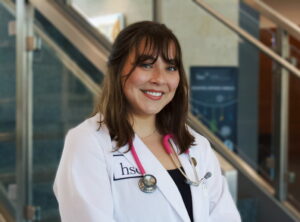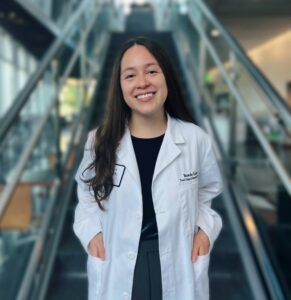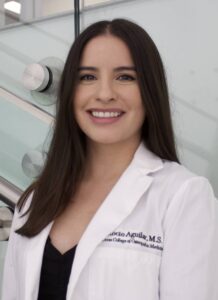TCOM students teaching medical Spanish to students nationwide
- January 17, 2024
- By: Steven Bartolotta
- Community
Related Links
Addressing perhaps one of the fastest-growing barriers to health care, medical students from The University of North Texas Health Science Center at Fort Worth’s Texas College of Osteopathic Medicine are teaching medical Spanish to their classmates to help them in clinical encounters with their future patients.
TCOM’s Latino Medical Student Association members, led by President Brenda Godoy and Spanish Curriculum Directors Rocio Aguilar and Rebeca Bosques, taught three lessons to classmates in the fall semester. LMSA members have been teaching medical Spanish for a few semesters and word spread throughout the osteopathic community about the popularity of the classes.

“In July of 2023 I was at a Student Osteopathic Medical Association meeting and started talking about it,” Bosques said. “As I’m networking with students from other schools, I’m telling them about what we are doing and they were interested.”
In particular, students from the DeBusk College of Osteopathic Medicine, located in Harrogate, Tennessee, asked for an opportunity to have the class taught to them virtually.
“It was shocking at first, but I brought the idea back to Brenda,” Bosques said. “I didn’t know how it was going to work, I’ve never done it virtually. We talked and told them about our experiences with the Spanish medical curriculum and just said we can make it work.”
“These students reached out on their own and wanted to learn so we wanted to make this happen,” Godoy said.

They put together a trial run using Zoom, recorded their presentation, and next thing they knew they were teaching medical Spanish to osteopathic medical students in Tennessee.
“It was really, ‘Wow, we are doing something like this,’” said Bosques. “It really highlights the fact that there is a need for medical Spanish. It’s especially important to me because we are in a part of the country where the patient demographics have many Spanish speakers and it’s important that these people are heard.”
While the classes taught online have been a success, the classes that LMSA has taught on campus have been just as successful. The three classes, one in August, one in September and one in October, have had more than 200 participants.
“The classes have really grown and it’s open to all students at HSC,” Godoy said.
With only an hour for each class, time doesn’t allow for a deep dive into Spanish itself, but the design of the classes is interactive and meant to encourage the students to take what they learn in the class and do more learning on their own.

“The first thing we do is review the body parts in Spanish,” Aguilar said. “After that, we go over the interviews, like a regular patient-doctor discussion, and try and interact with the students as well to help fill in the blanks. We also do this during lunch, so we talk about the cultural side of things and how they can communicate to patients about what they are eating if it’s healthy, and ways for them to practice some dialogue.”
The trio is motivated by their own experiences with the health care system as they have seen the harm of what the communication barriers can do.
“The language barrier really cuts the time down of the visit,” Bosques said. “I have really seen that with my extended family. I do think that many people are afraid to speak up because the system treats them like a burden.”
“It takes time for change in this profession, but we are seeing more and more Hispanics go to medical school, and in 10-20 years you will see more and more Spanish-speaking physicians,” Aguilar said.
All three have worked at clinics locally and been called on to serve as translators for patients who speak Spanish, and the reactions have always been the same when someone speaks their native tongue.
“It’s really nice to see how happy the patients get when they see a doctor or nurse speak Spanish,” Godoy said. “I have had people leave the office not knowing what they were diagnosed with, so the next time they come they will say they weren’t told. That’s why having students start off right now in medical school and go into residency and having this background of the language is so important and really cool.”
LMSA has plans to continue the medical Spanish classes in the spring semester and is looking to grow them beyond just TCOM students on campus.
“We are open to all of the programs,” Bosques said. “I would love for all of the programs on campus to be involved and make it more inclusive where we have med sci students, public health, PA, PT and pharmacy involved with this.”
“I’ve seen a lot of familiar faces and it’s been very valuable because people like these classes,” Aguilar said. “People have come to me and said these classes are great and we need to do this for our future patients. We want people to attend the class, spread the word, and for students to become aware and want to learn more about medical Spanish.






Social media